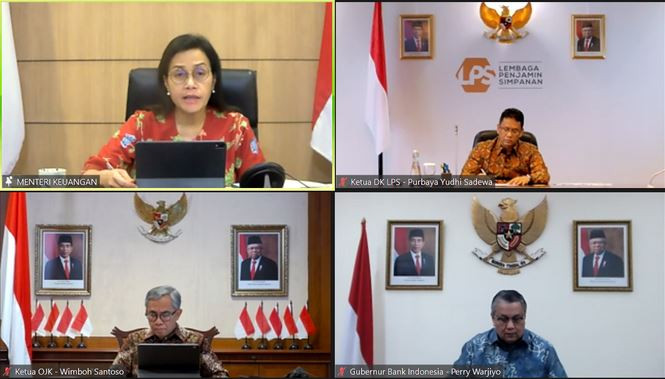Popular Reads
Top Results
Can't find what you're looking for?
View all search resultsPopular Reads
Top Results
Can't find what you're looking for?
View all search resultsEconomy showing signs of recovery
The country’s financial system remained stable in the third quarter and was expected to further support economic recovery going forward, said the KSSK.
Change text size
Gift Premium Articles
to Anyone
I
ndonesia’s economy showed an improvement in the third quarter following a deep slump in the second quarter amid uncertainty caused by the coronavirus pandemic, the Financial System Stability Committee (KSSK) has said.
The country’s financial system remained stable in the third quarter and was expected to further support economic recovery going forward, said the committee, whose members are the finance minister, Bank Indonesia (BI) governor, the Financial Services Authority (OJK) chairman and the Deposit Insurance Corporation (LPS) chairman, on Tuesday.
“The domestic economy has gradually improved after experiencing pressure in the second quarter [...] supported by accelerated fiscal stimulus disbursement and an improvement in exports,” said Finance Minister Sri Mulyani Indrawati, who serves as the committee’s chair, in a virtual briefing. “External sector resilience was also maintained as reflected in the low current account deficit for the whole of 2020, supported by a trade surplus of US$8.03 billion in the third quarter.”
The coronavirus outbreak has disrupted business activity and weakened purchasing power, resulting in a hard-hit economy. Indonesia’s gross domestic product (GDP) shrank 5.32 percent in the second quarter and is expected to shrink further, albeit at a slower pace, in the third quarter, which means the country will enter into a recession.
Statistics Indonesia (BPS) will announce the third quarter GDP in early November.
Sri Mulyani said the macroeconomic stability remained well-managed as inflation was low in September at 1.42 percent yoy because of falling demand.
At the same time, foreign exchange reserves rose to $135.2 billion in September from $131.7 billion in June while the rupiah exchange rate depreciated by 4.2 percent point-to-point against the United States dollar amid the high uncertainty in the global financial markets. The rupiah erased some of its losses in March and April when the volatile market sent the currency down more than 20 percent.
BI Governor Perry Warjiyo was of the view that the rupiah was still undervalued and, thus, had room to further strengthen in the fourth quarter in line with the improvement in financial system stability.
“We will take quantitative [easing] measures to boost the economy […] and we will maintain our accommodative monetary policy in 2021,” he told reporters in the same briefing. “The room for BI rate cuts remains open and we will continue to monitor economic developments.”
The central bank has cut the benchmark interest rate four times this year to 4 percent, bought government bonds as part of a burden-sharing program, cut the reserve requirement ratio and has undertaken monetary expansion as it tries to support an economy headed into its first contraction since the 1998 Asian financial crisis.
“The KSSK will continue to support the economic recovery by mobilizing all policy and regulatory instruments,” Sri Mulyani said. “A coordinated policy effort will be directed to boost credit growth by maintaining financial system stability.”
BI data show that banks’ loan disbursement grew by just 0.12 percent year-on-year (yoy) in September, falling further from 1.04 percent growth in August. Meanwhile, banks’ third-party funds increased by 12.88 percent yoy in September, higher than August’s figure of 11.64 yoy.
She expressed optimism that Indonesia’s economic performance would be somewhat better in the July-September period compared with the previous quarter supported by higher government spending and improved exports as a result of rising demand for Indonesian goods from China and the US.
“The government will continue to spend the state budget until the end of this year to maintain the progress of the economic recovery,” she went on to say. “We will continue the stimulus program even until 2021 to fully support the economy.”
A stronger Chinese yuan and a rebounding economy in China will be beneficial for Indonesia’s exports, Bahana Sekuritas analysts wrote in a research note on Oct. 23.
“Although the share of Chinese products among Indonesia’s total imports is higher compared with the share of Indonesian exports to China, we think a strong yuan will boost Indonesian exports more than imports, with demand recovery in China being faster than in Indonesia,” the note reads.
After recording a 6.8 percent contraction in its GDP in the first quarter caused by strict lockdowns, China expanded by 3.2 percent and 4.9 percent in the following quarters as other countries in the world continued to fight against economic contraction.
Meanwhile, Bank Permata economist Josua Pardede warned the KSSK to remain wary about such sectors as tourism and transportation that might feel a greater pinch during the economic downturn.
“We think the KSSK should pay attention to the large corporations in these sectors that are unable to pay their debts, to avoid an adverse impact on the financial system,” he told The Jakarta Post on Tuesday. “The decision to extend the debt restructuring by the OJK is appropriate, but now the government must speed up stimulus spending on large corporations.”










